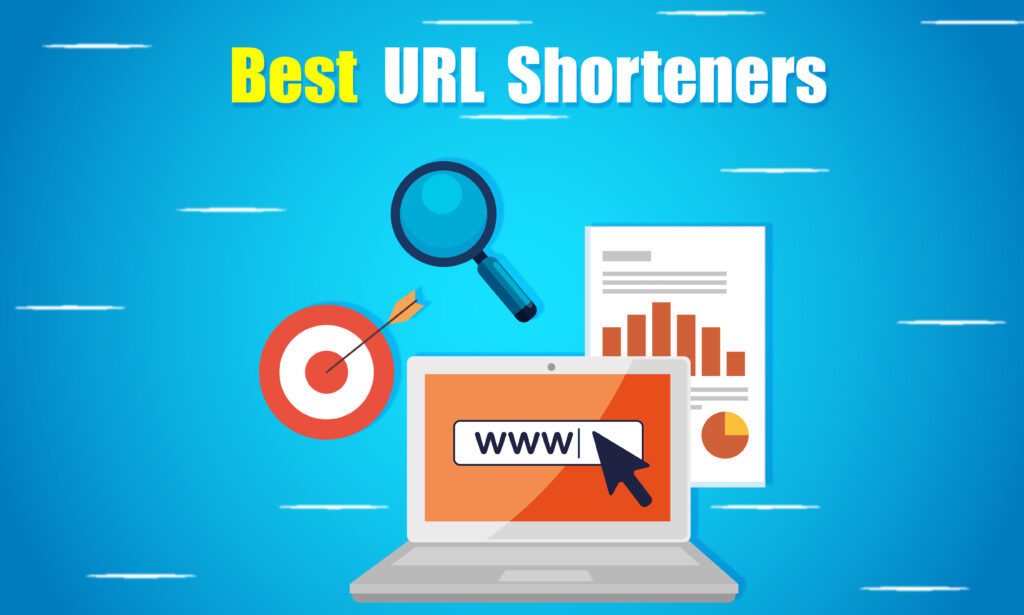Are you looking to shorten your URLs for better management and tracking? URL shorteners are powerful tools for transforming long web addresses into concise, manageable links, providing ease of sharing while enabling valuable analytics and customization. This comprehensive guide covers the best URL shorteners in 2025, with detailed information on features, pricing, and suitability for different user needs.
In this article, you’ll find everything you need to know about URL shortening, including how it works, its benefits, and criteria for choosing the right service. We’ll also share a list of the best URL shorteners to help you get started.
Introduction
In an era of digital communication, URL shorteners have become essential tools for businesses, marketers, and individual users alike. Whether you’re sharing links on social media, tracking marketing campaigns, or managing affiliate links, a URL shortener can make your life easier. This article will discuss the best URL shorteners in 2026, detailing their features, benefits, and how to choose the right one for your needs.
What is a URL Shortener?
A URL shortener is an online tool that reduces the length of a web address while still redirecting users to the original destination. Shortened URLs make sharing easier, especially on platforms with character limits, like Twitter. Besides link shortening, many services provide analytics, custom branding, and retargeting options.
Benefits of Using URL Shorteners
- Ease of Sharing: Short links are more manageable and easier to share in social media posts, emails, and text messages.
- Analytics and Tracking: Many URL shorteners provide detailed statistics on link performance, including click-through rates, geographic locations, and device types.
- Branding Opportunities: With custom-branded short URLs, you can enhance brand recognition and build trust.
- Improved User Experience: Short links look cleaner and more visually appealing.
- Link Management: URL shorteners often come with dashboards for managing and organizing multiple links.
- Retargeting Capabilities: Some services allow retargeting users who click on the links, improving marketing efficiency.
Criteria for Selecting the Best URL Shortener
When choosing a URL shortener, consider the following factors:
- Ease of Use: A straightforward interface for quick link shortening.
- Customization Options: The ability to create branded URLs and custom aliases.
- Analytics and Tracking: Access to detailed metrics for link performance.
- Integration Capabilities: Compatibility with social media tools, CRM systems, and marketing platforms.
- Security: Features like link expiration, password protection, and spam filters.
- Pricing: Free versus paid plans and the features offered.
Top 10 Best URL Shorteners in 2026
Here is the list of the top 10 Best URL shorteners in 2026:
- Bitly
- Rebrandly
- TinyURL
- T2M
- BL.INK
- Sniply
- Shorte.st
- Ow.ly
- Cutt.ly
- ClickMeter
1. Bitly
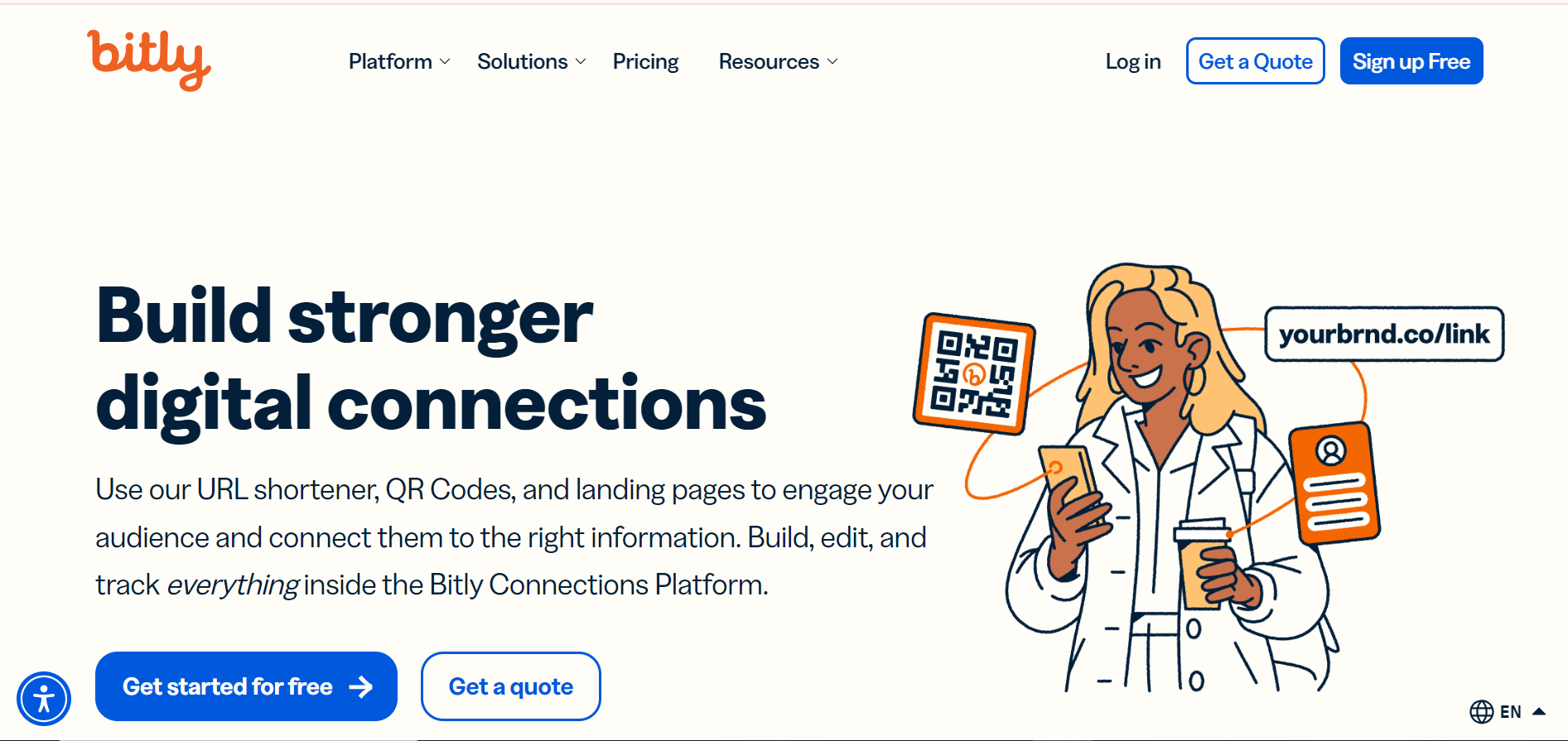
Bitly remains one of the most popular and widely used URL shorteners due to its comprehensive features and robust analytics capabilities. Bitly also supports bulk link shortening, making it an ideal choice for large-scale marketing campaigns where multiple URLs need to be managed simultaneously. Its link management platform allows users to organize, search, and categorize links easily, providing a streamlined workflow for digital marketing teams.
Additionally, Bitly’s enterprise-level security features, including encrypted connections and link expiration options, ensure that shared links remain safe and compliant with privacy standards. These advanced functionalities make Bitly a versatile tool suitable for businesses of all sizes, from small startups to large corporations.
Features:
- Allows custom-branded short URLs.
- Provides real-time analytics, including location and device tracking.
- Integrates with tools like Zapier, Salesforce, and HubSpot.
- Offers a mobile app for shortening and managing links on the go.
Pros:
- Comprehensive analytics and reporting.
- Supports branded domains for enhanced link customization.
- Mobile-friendly interface.
Cons:
- The free plan has limited features.
- Premium plans can be costly for small businesses.
- Pricing: Bitly offers a free plan with basic features and premium plans starting at $29 per month.
2. Rebrandly
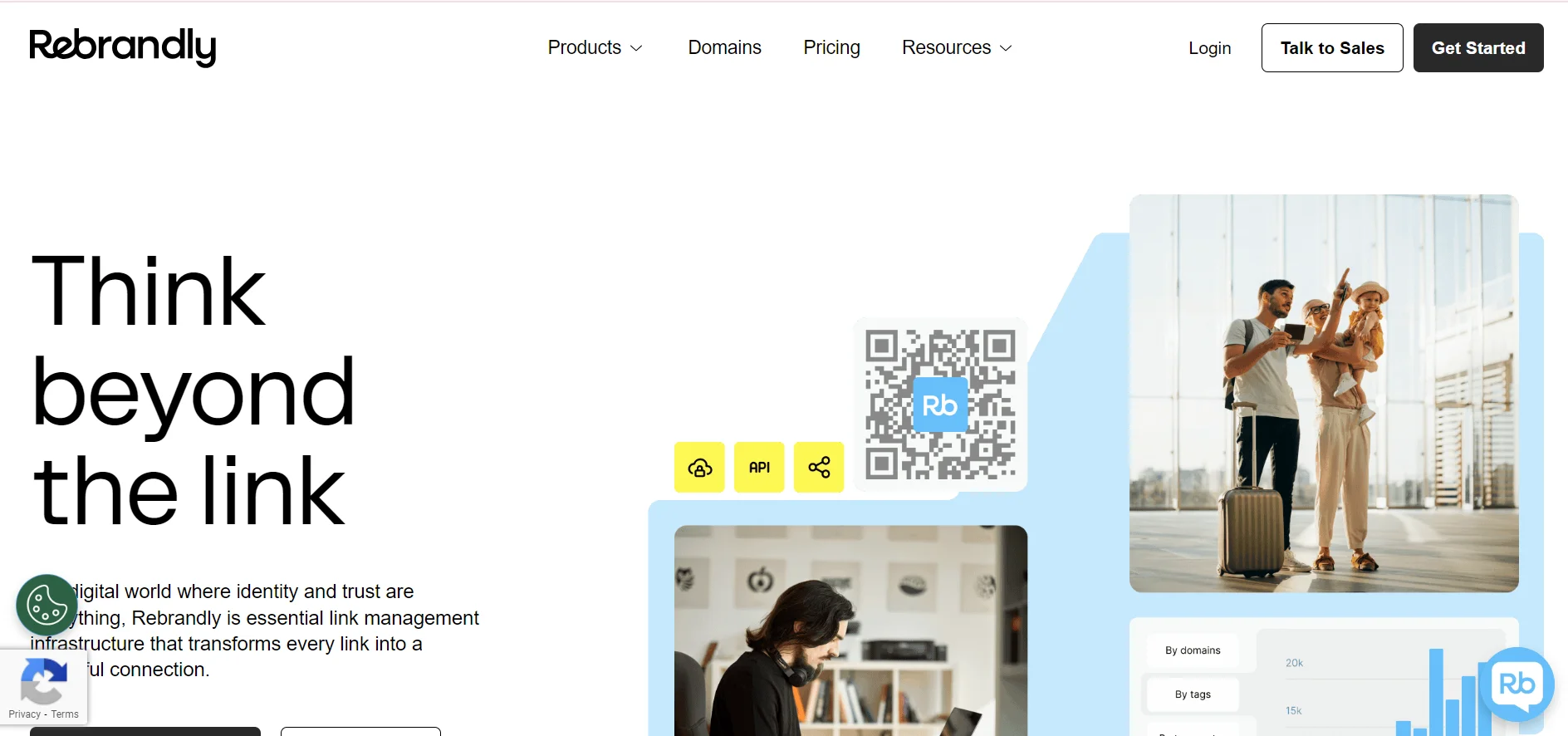
Rebrandly focuses on custom-branded links, making it ideal for businesses seeking to improve brand visibility through unique short URLs. Rebrandly also offers powerful integrations with popular marketing tools like Google Analytics, Zapier, and Slack, allowing users to track link performance seamlessly and automate workflows. Its advanced analytics capabilities provide insights into link clicks, traffic sources, and user behavior, helping businesses fine-tune their marketing strategies.
Furthermore, Rebrandly’s built-in link retargeting feature enables companies to retarget users who click on branded links, boosting the effectiveness of advertising campaigns. With robust API support, Rebrandly also caters to developers looking to integrate URL shortening and tracking functionalities into custom applications or platforms.
Features:
- Custom domains for branded short links.
- URL tracking with UTM parameters.
- Supports team collaboration and role-based access.
- Offers API access for developers.
Pros:
- Enhances brand recognition with personalized links.
- Integrates with Google Analytics, Slack, and other tools.
- Advanced tracking and retargeting options.
Cons:
- Premium features can be pricey for beginners.
- Learning curve for setting up custom domains.
- Pricing: Free plan available with limitations; premium plans start at $49 per month.
3. TinyURL
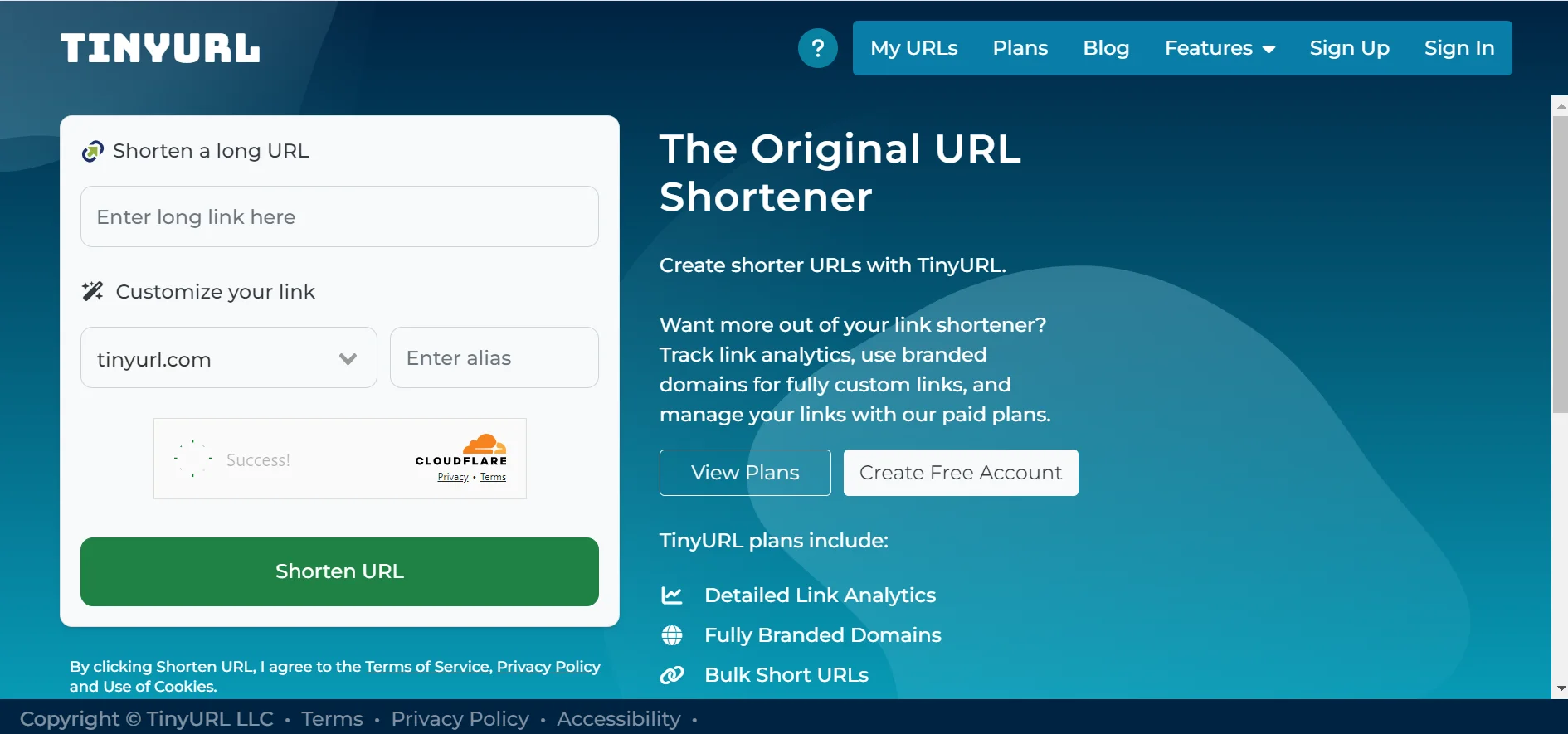
TinyURL has been a reliable choice for quick and simple URL shortening without the need for an account. Despite its simplicity, TinyURL offers some customization options, allowing users to create custom aliases for their shortened links, making them more recognizable and easier to remember. This feature is especially helpful for social media sharing, where concise and relevant links can significantly enhance engagement.
Additionally, TinyURL provides a browser extension that enables users to shorten URLs directly from their web browser, streamlining the process and saving time. While it may not offer the extensive analytics and branding features found in other services, TinyURL’s ease of use and accessibility make it a go-to solution for users who need a straightforward URL shortener.
Features:
- Easy-to-use interface for quick URL shortening.
- Allows custom aliases for personalized short links.
- No registration required.
Pros:
- Completely free and user-friendly.
- Suitable for occasional use.
Cons:
Lacks detailed analytics and tracking.
Limited customization compared to competitors.
Pricing: TinyURL is free, but a Pro plan with more features is also available.
4. T2M
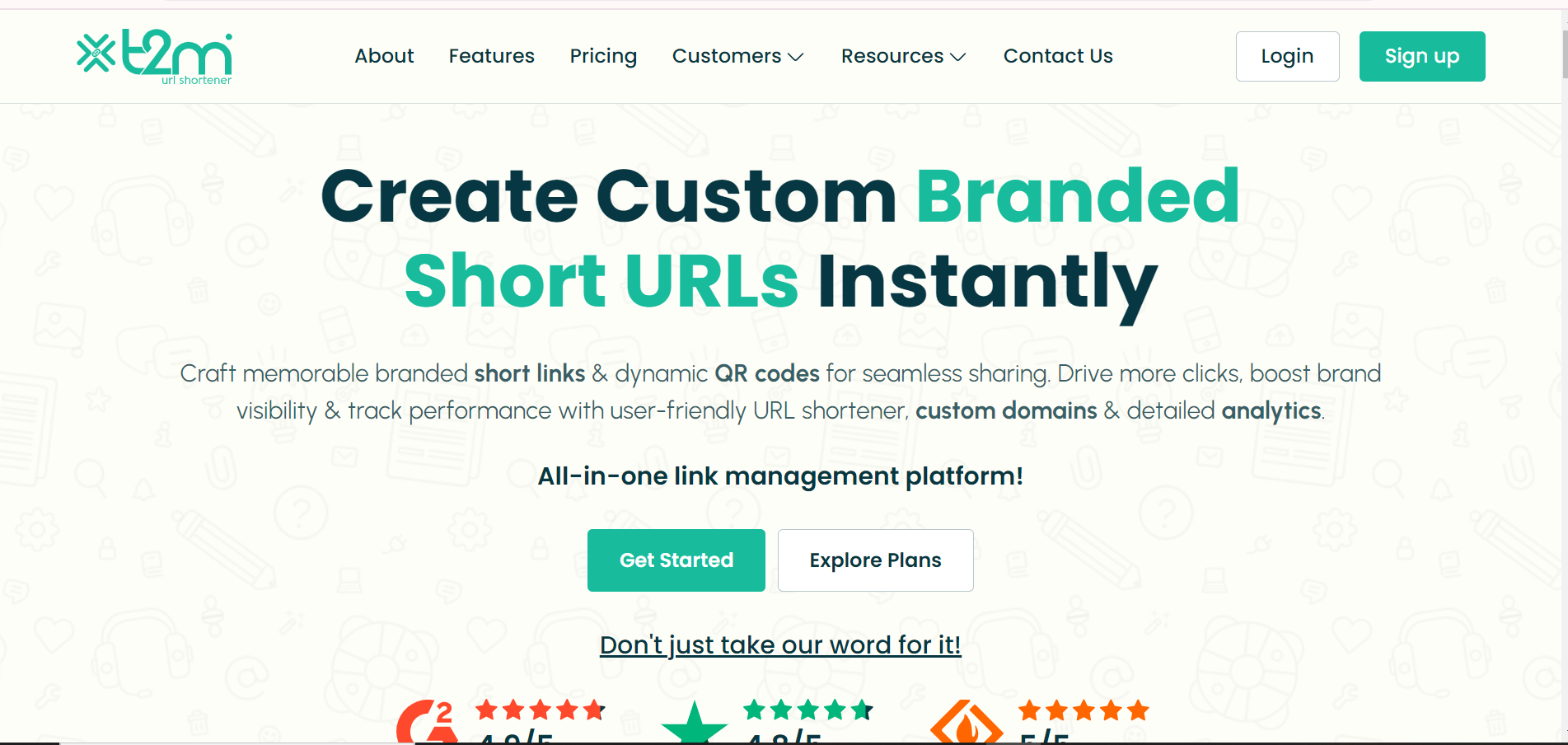
T2M offers comprehensive link tracking and management features, making it a suitable choice for businesses looking for detailed analytics. In addition to its robust analytics, T2M stands out by providing unlimited URL shortening and redirection capabilities, even in its paid plans, making it an excellent choice for businesses with high-volume needs.
The platform also generates QR codes for every shortened link, allowing for easy offline sharing and cross-channel marketing opportunities. T2M supports password protection and link expiration features, giving users greater control over link security and access. With options for custom-branded domains and a user-friendly dashboard, T2M caters to organizations that need a versatile link management solution while maintaining simplicity in its interface.
Features:
- Unlimited URL shortening for paid plans.
- Generates QR codes for each link.
- Lifetime link history and analytics.
- Password-protected links.
Pros:
- Robust analytics dashboard.
- Supports multiple user roles.
- Provides link expiration options.
Cons:
- The free version has limitations.
- The interface may feel complex for new users.
- Pricing: Free plan available; paid plans start at $5 per month.
5. BL.INK
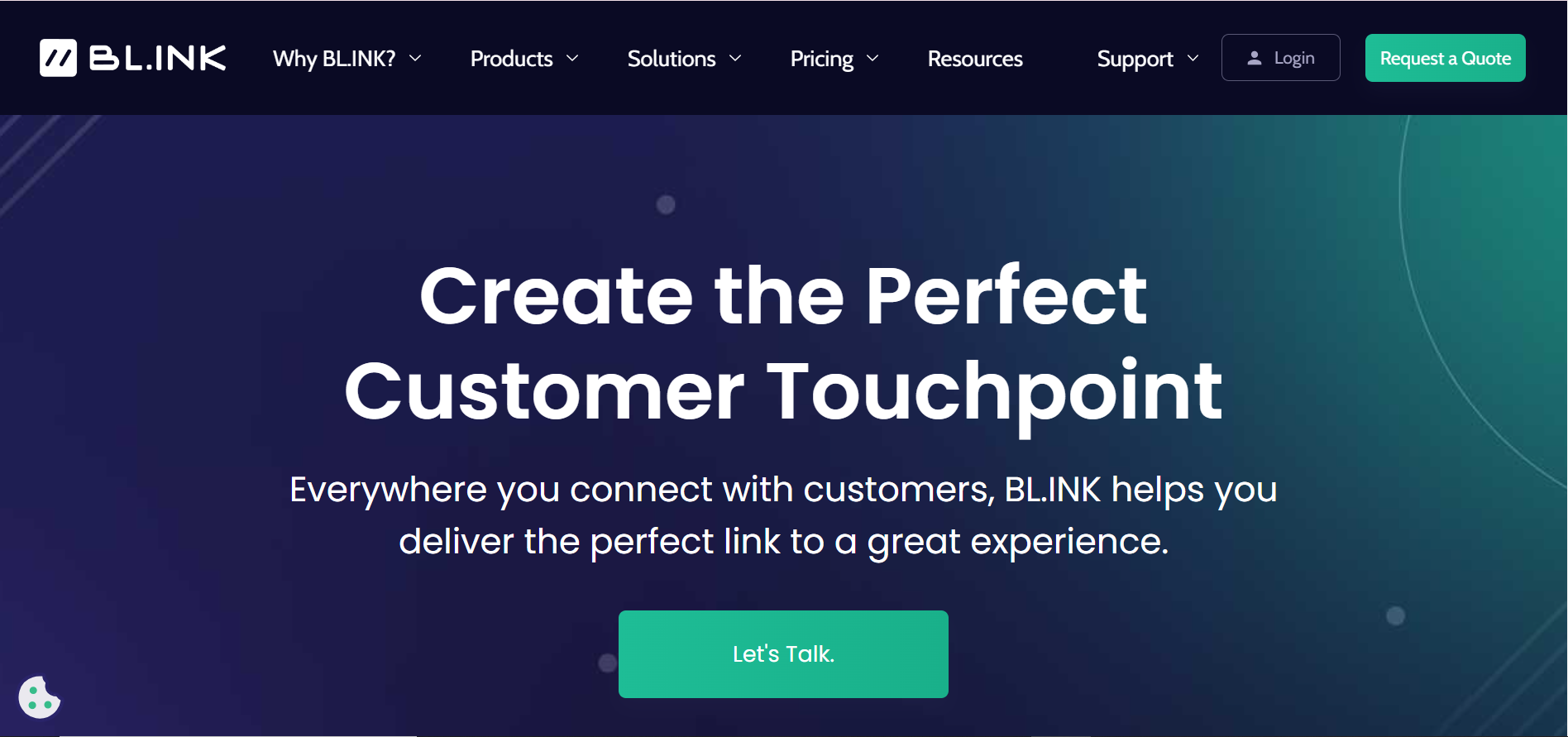
BL.INK caters to enterprises and large teams with features that support link tracking, segmentation, and team management. BL.INK goes beyond basic link shortening by offering in-depth analytics that allow users to segment data based on various parameters, such as geography, device type, and referral source, providing granular insights into audience behavior. The platform’s collaboration tools enable teams to work together efficiently, with features like role-based access controls and link approval workflows that streamline the management of shared links.
Additionally, BL.INK integrates with major marketing platforms, including Salesforce, Marketo, and HubSpot, making it easy for businesses to incorporate link tracking into their existing marketing ecosystems. This combination of advanced features and integration capabilities makes BL.INK an excellent choice for organizations seeking a comprehensive and scalable link management solution.
Features:
- Custom short URLs and branded domains.
- Advanced analytics with segmentation and tracking.
- Team collaboration with multiple roles and permissions.
- API access for developers.
Pros:
- Ideal for enterprise use.
- Detailed segmentation capabilities.
- Suitable for teams with varying access needs.
Cons:
- Expensive for small businesses or individuals.
- Complex setup for individual users.
- Pricing: BL.INK offers a free plan for basic users; premium plans start at $48 per month.
6. Sniply
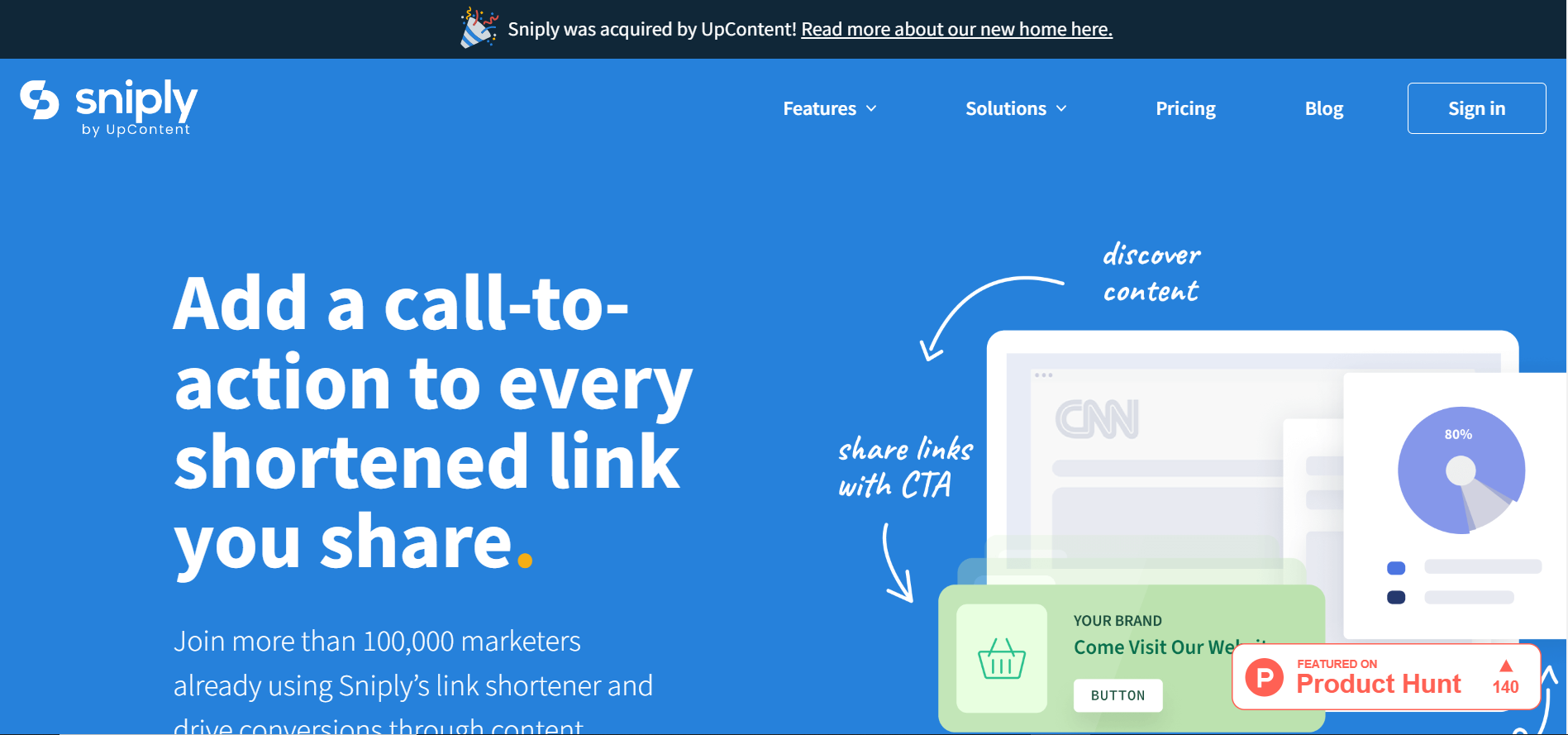
Sniply is unique among URL shorteners, allowing users to embed a call-to-action (CTA) on any page shared through its platform. In addition to embedding CTAs, Sniply offers customization options that allow users to tailor the appearance and behavior of the CTA to match their brand’s aesthetics and messaging. This includes adjusting button colors, fonts, and placements, as well as configuring the CTA to appear as a popup or sticky bar.
Sniply’s analytics dashboard provides detailed insights into the performance of each CTA, including click-through rates and conversions, enabling marketers to optimize their campaigns effectively. Moreover, Sniply supports retargeting pixels, allowing users to build custom audiences and retarget them with ads across various platforms, making it a powerful tool for enhancing content marketing and lead generation efforts.
Features:
- Embeds custom CTAs on shared content.
- Link retargeting capabilities.
- URL tracking and analytics.
- Custom short URLs with branded domains.
Pros:
- Increases engagement with embedded CTAs.
- Suitable for content marketers and social media managers.
Cons:
- Can be costly for small businesses.
- Limited free plan features.
- Pricing: Free trial available; premium plans start at $29 per month.
7. Shorte.st
Shorte.st not only shortens URLs but also allows users to earn money for each click generated through their links. Shorte.st employs a straightforward monetization model, making it an attractive option for content creators and bloggers who want to generate passive income from their shared links. The platform supports various payout methods, including PayPal and Payoneer, offering flexibility in receiving earnings.
In addition to link monetization, Shorte.st provides basic analytics to track the performance of shortened URLs, such as the number of clicks and geographic distribution of the audience. Users can also take advantage of browser extensions for quick URL shortening, making it easier to monetize links directly from the web. However, it is worth noting that some ad blockers may interfere with Shorte.st links, potentially reducing visibility for some users.
Features:
- Monetization options for link clicks.
- Browser extension for quick link shortening.
- Basic link analytics.
Pros:
- Provides an additional income stream.
- Free to use.
Cons:
- Some ad blockers may block shortened links.
- Limited customization and tracking capabilities.
- Pricing: Free to use, with monetization options for earning from clicks.
8. Ow.ly
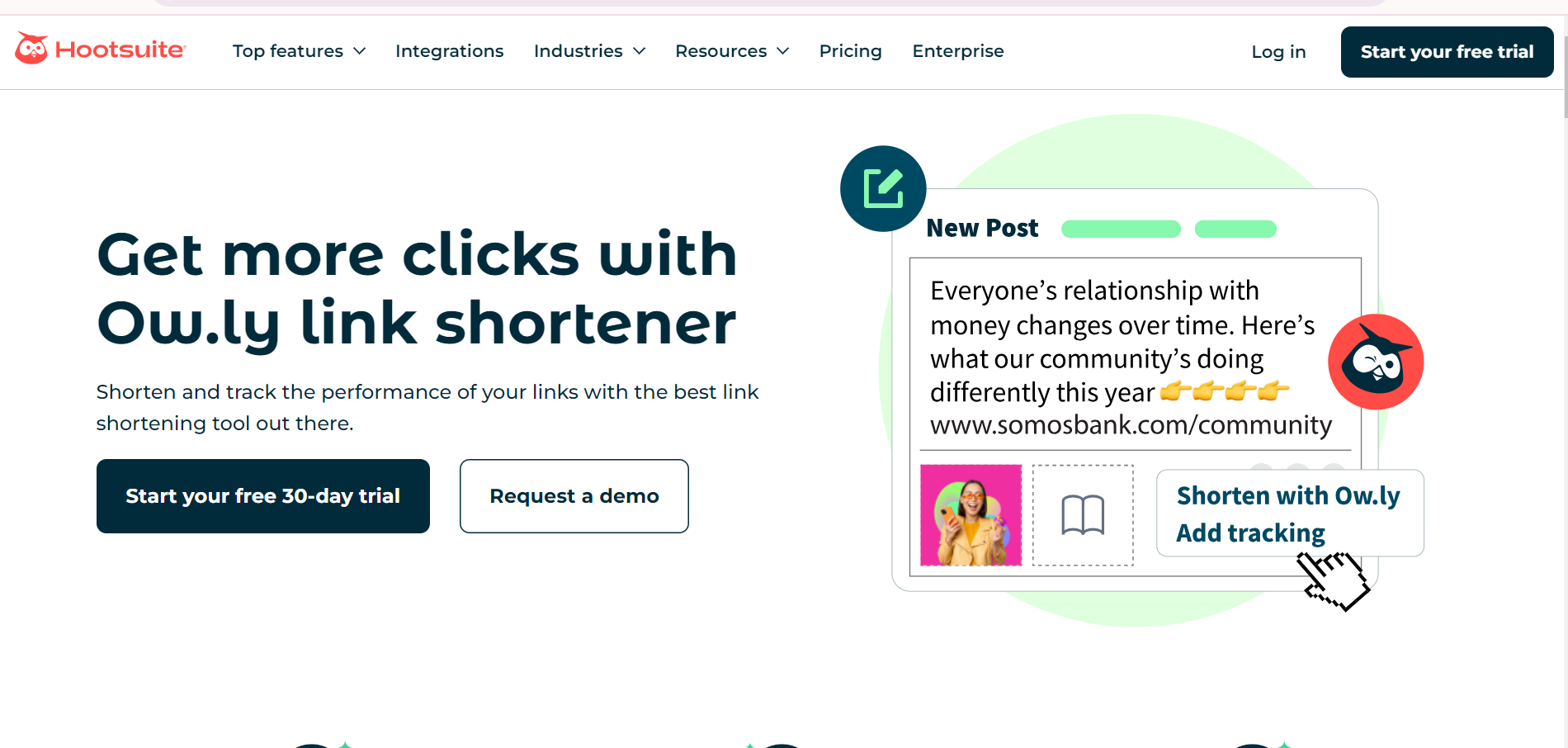
Ow.ly is a URL shortener integrated into the Hootsuite social media management platform. It provides seamless link shortening and tracking for social media content. In addition to its link shortening capabilities, Ow.ly enhances social media marketing by allowing users to schedule posts with shortened links, making it easier to maintain a consistent posting schedule. This integration with Hootsuite’s powerful scheduling and content management tools provides a comprehensive solution for managing social media campaigns.
Ow.ly’s tracking features enable users to measure the effectiveness of their content, helping them understand which posts drive the most engagement and traffic. The platform also supports link previews, allowing marketers to customize how their content appears when shared, which can improve click-through rates and user experience.
Features:
- Integrates with Hootsuite for social media management.
- Tracks link performance metrics.
- Allows scheduling posts with shortened links.
Pros:
- Ideal for social media managers using Hootsuite.
- Simplifies social media management and link tracking.
Cons:
- Limited to Hootsuite users.
- Basic analytics compared to standalone URL shorteners.
- Pricing: Included with Hootsuite subscriptions, starting at $19 per month.
9. Cutt.ly
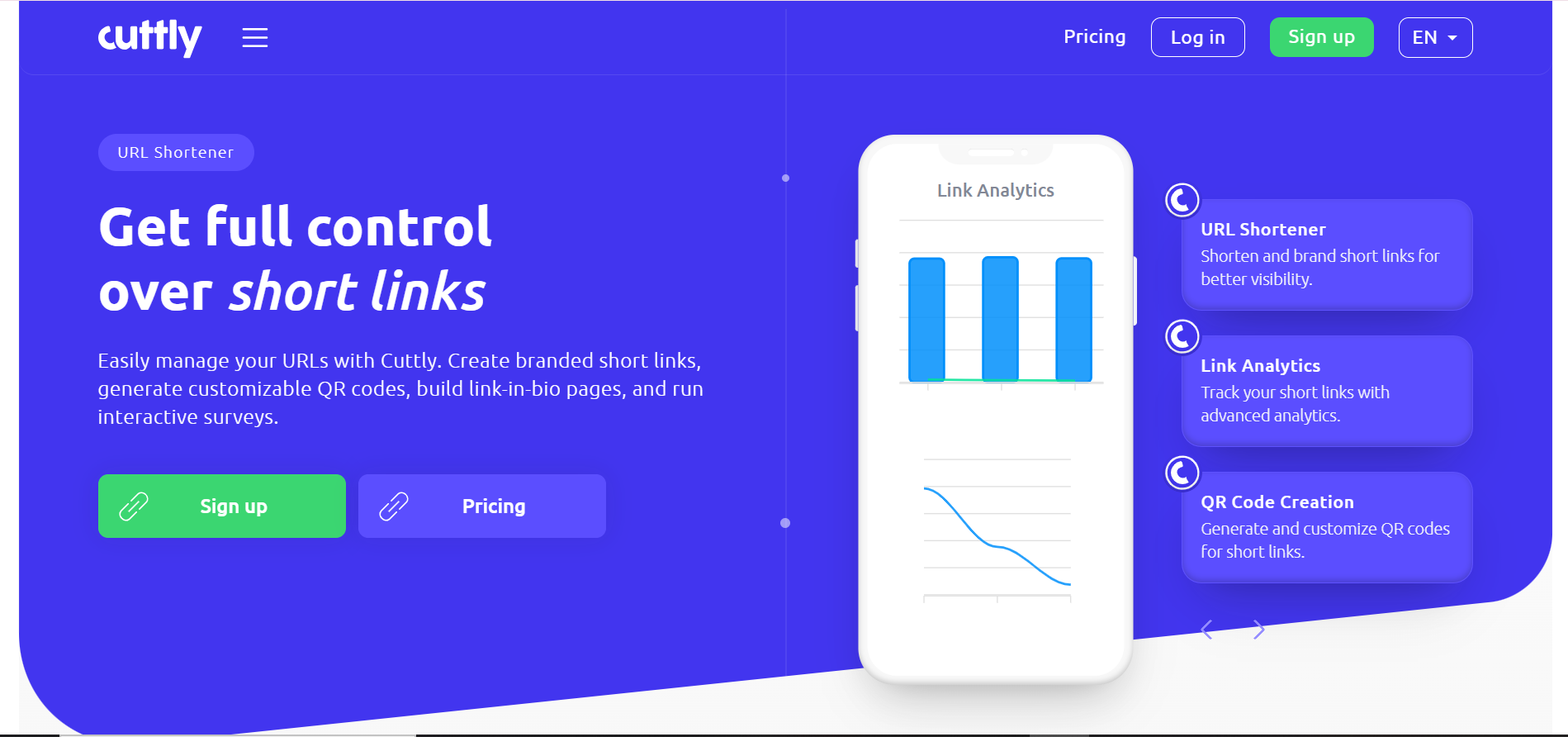
Cutt.ly offers a free URL shortener with some premium features, including basic analytics and link customization options. Cutt.ly provides users with real-time analytics, giving insights into the number of clicks, geographic locations, and device types used by visitors, which can help refine marketing strategies. The platform also supports custom-branded domains, allowing businesses to create personalized short links that enhance brand visibility and trust.
Additionally, Cutt.ly offers link expiration and password protection features for added security, making it a versatile tool for managing sensitive or time-limited content. With its user-friendly interface and support for QR code generation, Cutt.ly caters to both individual users and businesses looking for a flexible and affordable URL shortening solution.
Features:
- Real-time click tracking.
- Custom alias for short links.
- QR code generation.
- Link expiration settings.
Pros:
- Free plan with advanced features.
- Basic analytics included.
Cons:
- Interface may feel less intuitive than competitors.
- Limited integrations compared to other tools.
- Pricing: Free with premium plans starting at $25 per month.
10. ClickMeter
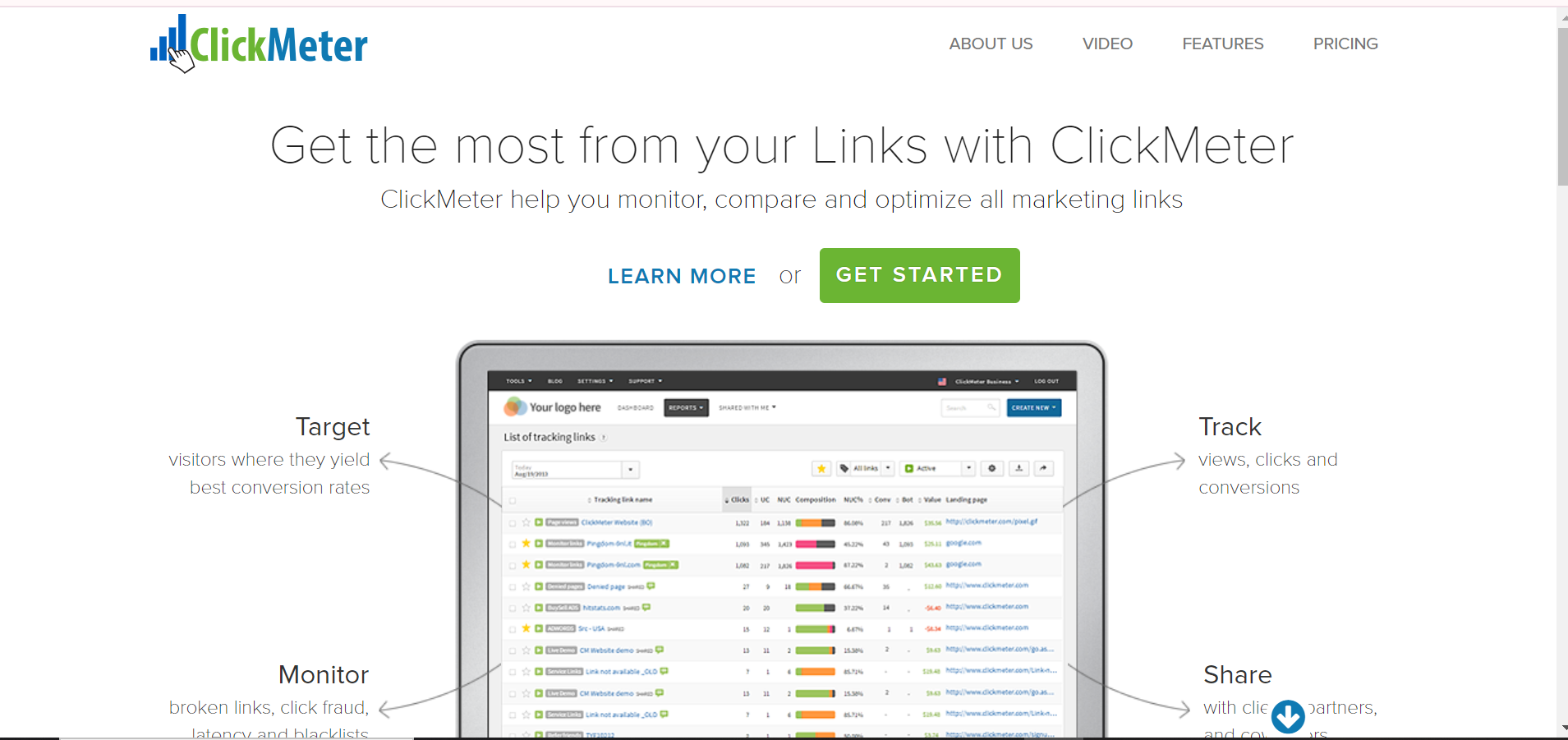
ClickMeter is an advanced tracking tool that provides URL shortening alongside detailed link tracking and conversion tracking capabilities. ClickMeter goes beyond basic URL shortening by offering robust features for digital marketers, including conversion tracking that allows users to monitor the effectiveness of marketing campaigns across various channels. The platform supports A/B testing, enabling users to compare the performance of different links and optimize their strategies for better results.
Additionally, ClickMeter integrates with popular marketing and analytics tools such as Google Analytics, providing a seamless workflow for tracking and analyzing campaign data. With features like geo-targeting and device-based tracking, ClickMeter offers granular control over how links are managed and measured, making it an ideal choice for businesses that require comprehensive link analytics and optimization capabilities.
Features:
- Conversion tracking for marketing campaigns.
- Real-time analytics for various metrics.
- Supports A/B testing for optimizing links.
- API for developers.
Pros:
- Ideal for digital marketers.
- Offers comprehensive tracking and analysis.
Cons:
- High pricing for individual users.
- Steeper learning curve for beginners.
- Pricing: Starts at $29 per month.
Conclusion
URL shorteners provide a valuable service by simplifying long links and enabling analytics for tracking performance. Choosing the right tool depends on your needs. For businesses seeking advanced features and branding, Bitly and Rebrandly are great options. For simple link shortening, TinyURL and Cutt.ly are suitable. Evaluate factors such as ease of use, customization, analytics, and pricing to find the best URL shortener for your purposes.
Frequently Asked Questions (FAQs)
What is the best URL shortener for businesses in 2024?
Bitly and Rebrandly are popular choices for businesses due to their advanced analytics and branding capabilities.
Are URL shorteners free to use?
Yes, many URL shorteners offer free plans with basic features. Services like TinyURL and Shorte.st provide free URL shortening, while others like Bitly have free and premium versions.
Can URL shorteners affect SEO?
No, most URL shorteners use 301 redirects, preserving SEO value. Always use trusted services to avoid issues with spam or blocked links.
What is the best free URL shortener?
TinyURL and Cutt.ly are suitable for users who need a free service with basic customization and analytics.
How do URL shorteners make money?
URL shorteners often offer premium plans for advanced features, while services like Shorte.st monetize through advertising, sharing revenue with users.
